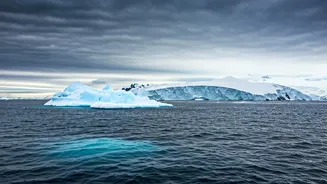Alarming Melt Rate
Scientists have expressed serious concern regarding the increasing speed at which Antarctica's ice is melting. This heightened rate of melting is particularly
alarming because it exceeds previously estimated timelines. The rapid ice loss is a direct consequence of rising global temperatures. The implications of this accelerated melting are extensive, potentially causing significant changes in sea levels. As a result, coastal communities across the globe are at an elevated risk. Research focuses on understanding how quickly the ice sheets are diminishing, pinpointing the specific areas most affected, and developing strategies to mitigate the effects of this accelerated melting, emphasizing the necessity of immediate, decisive action to combat the effects of a rapidly changing climate.
Irreversible Tipping Point
The research brings to light the potential for Antarctica to reach an irreversible climate tipping point. This crucial point implies that once a certain threshold of ice melt is crossed, the process becomes self-perpetuating, making it almost impossible to reverse. The concept of a tipping point underscores the critical nature of the situation and the urgency needed for comprehensive climate action. The potential consequences of reaching this tipping point include significant sea-level rise, substantial alterations in global weather patterns, and the loss of essential ecosystems. Such changes would profoundly impact the environment and human societies across the globe. Preventing this event necessitates a strong commitment to substantial reductions in greenhouse gas emissions and the adoption of robust environmental protection measures, signifying the critical importance of immediate intervention.
Consequences Detailed
The effects of Antarctica's accelerating ice melt are multifaceted and far-reaching. One of the most immediate consequences is the rise in global sea levels, putting coastal areas and low-lying regions at high risk of flooding and erosion. Furthermore, the melting of ice impacts ocean currents, potentially disrupting global weather patterns and contributing to more extreme weather events. The loss of ice also threatens unique Antarctic ecosystems, impacting wildlife that depend on the ice. These changes will exacerbate existing climate-related challenges, including increased water scarcity and loss of biodiversity. Dealing with these diverse and serious consequences necessitates a unified global approach, encompassing significant emission reductions, conservation of vulnerable ecosystems, and preparedness for the resulting changes.
Scientific Urgency
Scientists are actively engaged in studying the factors behind Antarctica's ice melt, and they are seeking solutions. They employ advanced technologies such as satellite imagery and climate models to track ice sheet changes and predict future scenarios. Their focus includes understanding the complex interplay between atmospheric and oceanic processes, which significantly affect the rate of ice loss. Through these investigations, scientists hope to better understand the specifics of climate change effects, develop more accurate predictions, and formulate better strategies to mitigate the effects. This work underscores the critical need for continued research, international collaboration, and the effective dissemination of scientific findings to promote informed decision-making and foster more effective climate action.
Call to Action
The situation in Antarctica stresses the need for urgent action to address climate change. Mitigating the risks linked with ice melt demands global cooperation, including an all-encompassing strategy that aims at lessening emissions, boosting renewable energy sources, and upholding environmental conservation. Governments, industries, and people should take action. This involves implementing sustainable practices, supporting climate-friendly policies, and increasing awareness of the critical importance of protecting the Antarctic environment. Such steps are essential for securing a stable climate and safeguarding the environment for future generations. The focus is on a global pledge to ensure a more sustainable and resilient future for everyone, highlighting the importance of immediate, decisive actions.



















